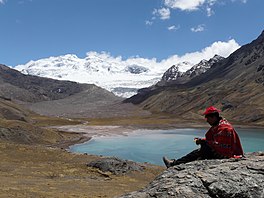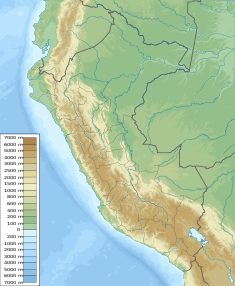Lake Sibinacocha
Appearance
| Lake Sibinacocha | |
|---|---|
 Lake Sibinacocha with Chumpe in the background | |
| Location | Cusco Region |
| Coordinates | 13°51′24″S 71°01′30″W / 13.85667°S 71.02500°W |
| Basin countries | Peru |
| Max. length | 15.19 km (9.44 mi) |
| Max. width | 2.86 km (1.78 mi) |
| Surface elevation | 4,873 m (15,988 ft) |
| Sibinacocha Dam | |
|---|---|
 | |
| Opening date | 1996 |
| Dam and spillways | |
| Type of dam | Earthen dam |
| Height | 12 m (39 ft) |
| Length | 357 m (1,171 ft) |
| Reservoir | |
| Total capacity | 110,000,000 m3 (89,000 acre⋅ft) |
| Power Station | |
| Operator(s) | EGEMSA |
| Website Represa de Sibinacocha | |
Lake Sibinacocha[1][2] (possibly from Quechua siwina whistle, qucha lake, lagoon)[3] is a lake in Peru. It is ranked as the 22nd[4] highest lake in the world. It is located in the Cusco Region, Canchis Province, Pitumarca District.[2] The lake is situated at a height of approximately 4,873 metres (15,988 ft), about 15.19 km long and 2.86 km at its widest point. Sibinacocha lies in the Vilcanota Range, south of Chumpe and southwest of Condoriquiña.[1]
An earthen dam was erected at the lake in 1996.[5] It is 357 m (1,171 ft) long and 12 m (39 ft) high.[5] The reservoir has a volume of 50,000 m3 (41 acre⋅ft) and a capacity of 110,000,000 m3 (89,000 acre⋅ft).[5] It is operated by EGEMSA.[5]
See also
References
- ^ a b Peru 1:100 000, Ocongate (28-t). IGN (Instituto Geográfico Nacional - Perú).
- ^ a b escale.minedu.gob.pe - UGEL map of the Canchis Province (Cusco Region)
- ^ Teofilo Laime Ajacopa (2007). Diccionario Bilingüe: Iskay simipi yuyayk’anch: Quechua – Castellano / Castellano – Quechua (PDF). La Paz, Bolivia: futatraw.ourproject.org.
- ^ Drews, Carl. "The Highest Lake in the World". www.highestlake.com/. Retrieved 2 September 2012.
- ^ a b c d Recursos Hídricos del Perú en Cifras (in Spanish). Autoridad Nacional del Agua / MINAG - Perú. 2010. p. 58.

